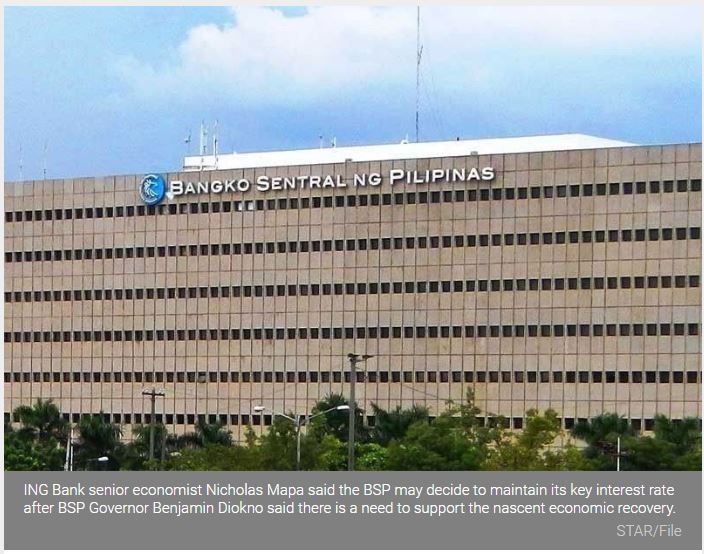Philippines: Economists see BSP keeping rates at record low
MANILA, Philippines — Economists expect the Bangko Sentral ng Pilipinas (BSP) to maintain its accommodative policy stance by keeping key interest rates on hold to help the economy fully recover from the pandemic-induced recession.
ING Bank senior economist Nicholas Mapa said the BSP may decide to maintain its key interest rate after BSP Governor Benjamin Diokno said there is a need to support the nascent economic recovery.
“Given the stark drop in economic activity, with the Philippines now only a shade of its former economic self, it’s quite clear the economy needs all the support it can get to dig out of the deep recessionary hole it is currently in,” Mapa said.
Mapa said any recalibration of its stance or rate hike at this point may undermine recovery efforts and delay the already belated return to pre-COVID-19 level.
The Dutch financial giant expects inflation to decelerate starting June after averaging 4.4 percent from January to May, above the BSP’s two to four percent target, due to supply-side constraints brought about by weather-related disturbances and the African swine fever (ASF) outbreak.
“We expect inflation to start decelerating by June and back within target as early as July, which should ease some pressure on the BSP to recalibrate and hike rates at this juncture,” Mapa said.
Diokno earlier emphasized the need to remain vigilant against possible signs of second round effects and build-up of asset price inflation.
Security Bank chief economist Robert Dan Roces is also expecting the BSP to keep its rates steady as the reimposed lockdowns weighed on confidence that affected services, manufacturing, as well as wholesale and retail.
ANZ Research economist Rini Sen said the Monetary Board may keep the benchmark interest rate at a record low of two percent on June 24.
“The efficacy of monetary policy is fading, considering the recent decline in bank lending and incomplete transmission of lower policy to lending rates. For now, we believe more liquidity support will be warranted by the central bank in place of any action on the rates side,” Sen said.
The COVID-19 response measures of the BSP last year unleashed P2.2 trillion into the financial system.
“Therefore, we expect the BSP to focus squarely on liquidity this year. As such, we expect policy accommodation to stay at least until mid-2022 following which the policy rate is likely to be gradually raised,” Sen said.
Alvin Arogo, economist at Philippine National Bank, said the above ceiling average inflation would make it challenging for the BSP to cut the policy rate further.
“We believe the Monetary Board will keep the policy rate at two percent. The improvement in the inflation path, due to lower tariffs and higher quota for imported pork, should reduce the pressure on the BSP to prematurely raise the reverse repurchase rate amid a fragile economy,” Arogo said.
Source: https://www.philstar.com/business/2021/06/21/2106880/economists-see-bsp-keeping-rates-record-low


 English
English




